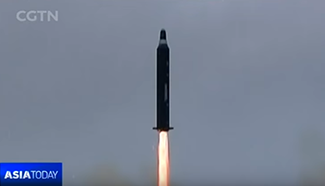TEHRAN, Feb. 1 (Xinhua) -- The Islamic republic on Wednesday confirmed the recent ballistic missile test and the officials unanimously called the test "inalienable right" of the country to boost deterrent power.
Iran's Defense Minister Hossein Dehqan said "the recent (missile) test was in line with our programs, and we will not allow any outsider to interfere in our defense affairs," Tasnim news agency reported.
Iran's missile test by no means contradicts the Iranian nuclear deal, known as JCPOA, nor United Nations Security Council Resolution 2231, the minister said.
Resolution 2231, adopted on July 20, 2015 to endorse a nuclear deal between Iran and six world powers, calls upon Iran not to undertake any activity related to ballistic missiles designed to be capable of delivering nuclear weapons, including launches using such ballistic missile technology.
The defense minister said that the country's missile tests are part of Iran's defense plans aimed at fulfilling its national interests, and no one or country could affect the country's plans and decisions.
He reiterated that Iran's missile program is for deterrence purposes.
Details of the recent missile test by the Islamic republic has not been publicized, but it was the first test by Iran after new U.S. President Donald Trump took office on Jan. 20.
In a statement issued on Wednesday, a total of 220 lawmakers voiced their "full-fledged support" for Iran's armed forces, saying "the reinforcement of the defense capabilities of the Islamic Republic of Iran in line with deterrence strategy" is an absolute necessity to ensure the country's security, Press TV reported.
Iran, "unlike other major world powers, has not defined its power based on (the possession of) weapons of mass destruction," the Iranian legislators said.
The sole way to ward off any act of aggression against Iran is to boost the country's missile might, the lawmakers said.
On Tuesday, Iran's Foreign Minister Mohammad Javad Zarif warned Washington against fomenting new tension over the missile program of the Islamic republic.
Zarif expressed the hope that Iran's missile program would not be used as an excuse by the new U.S. administration to create new tension for his country.
Iran's tests of missiles fall outside United Nations Security Council Resolution 2231, Zarif said in a joint press conference with his visiting French counterpart.
The resolution only points to the ballistic missiles that can carry nuclear warheads, he said.
"We have announced that none of our ballistic missiles are designed to carry nuclear warheads," Zarif said. "Iran would not allow others to decide on its defense program."
Also, Iran's Foreign Ministry spokesman on Tuesday reasserted the country's right to carry out missile tests as part of its defense plans for national security.
Bahram Qasemi highlighted that testing missiles is part of Iran's "inalienable right" to ensure its security and national interests, stressing that making comments on Iran's missile tests falls outside the purview of any foreign country or international organization.
"The Islamic Republic of Iran will not ask for permission from anyone to defend itself," the spokesman stressed, giving an assurance that all ballistic missile tests by Iran are in conformity with the country's international commitments.
Qasemi described the U.S. attempts to accuse Iran of provocative actions, including the missile tests, as hue and cry with political purposes.














